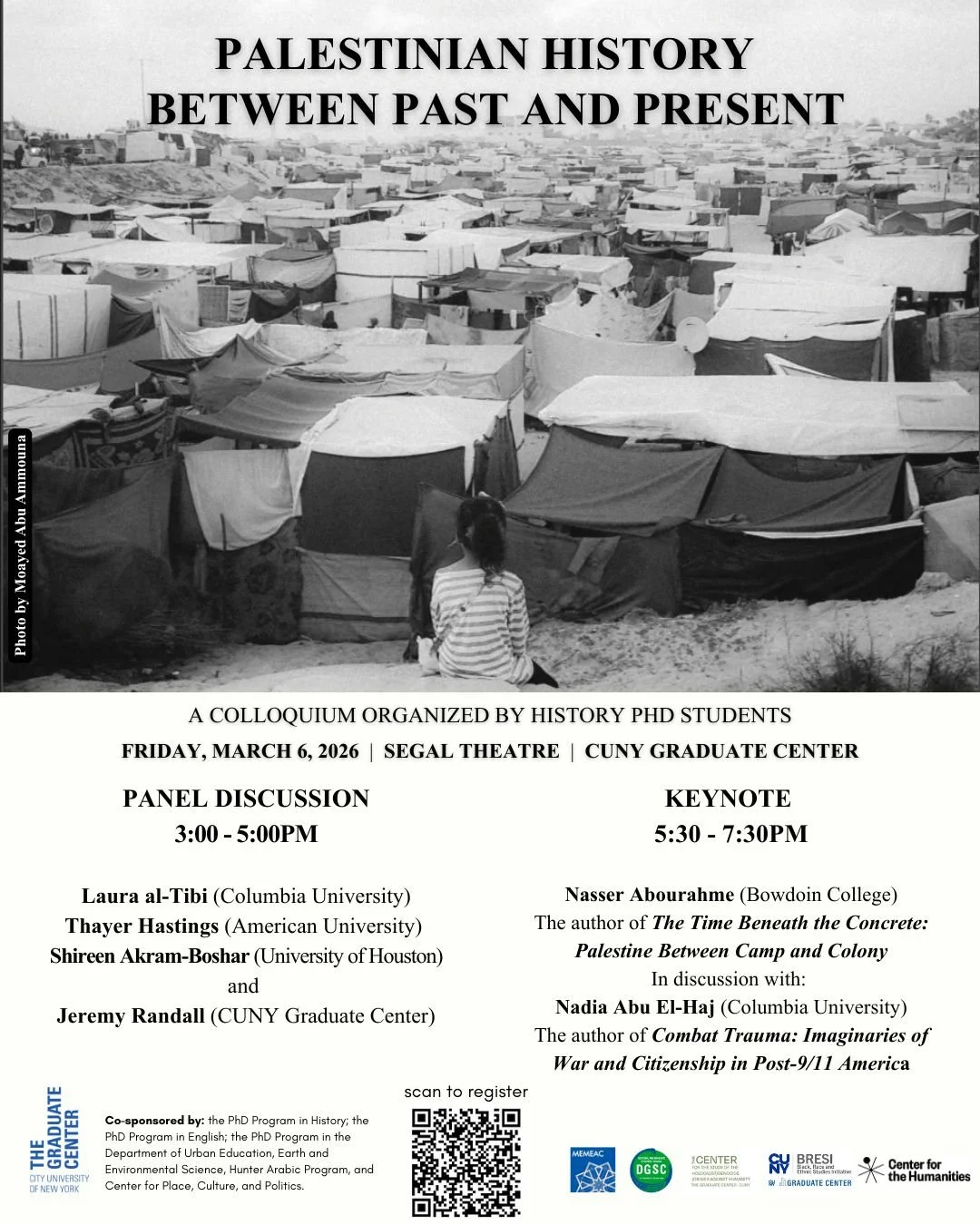Featuring: Lila Abu-Lughod, Zahra Ali, Sa’ed Atshan, Elizabeth Bernstein, Abigail Boggs, Judith Butler, Leslie Calman, Tina Campt, Elizabeth Castelli, Edwidge Danticat, Lisa Duggan, Alexis Pauline Gumbs, Jack Halberstam, Saidiya Hartman, Janet Jakobsen, Rebecca Jordan-Young, Temma Kaplan, Margot Kotler, Greta LaFleur, Sophie Lewis, Nick Mitchell, Manijeh Moradian, Amber Musser, Premilla Nadasen, Anupama Rao, Catherine Sameh, Evren Savci, C. Riley Snorton, Thenmozhi Soundararajan, Catharine R. Stimpson, Neferti Tadiar, Maya Wind, Jacqueline Woodson, and more.
Friday, February 27, 2026, 10am – 7pm
& Saturday, February 28, 2026, 10am – 6:30pm
See detailed program information below.
For half of a century, The Scholar and Feminist Conference has provided a mutually galvanizing space for scholars, activists, and artists to confront the most pressing issues at any given moment. Defining scholarship as for action from the very beginning, the conference has with unflagging regularity “met the moment” with intersectional feminist knowledge to inspire and build a robust response to contemporary crises. In many ways, the conference has grown up alongside academic feminism itself, yet, rather than uncritically mirror this history, it has consistently pushed back against feminism’s institutionalization. The conference highlights provocations, controversies, foundational gaps, and struggles that both cement its field-forming position and trouble a feminist progress narrative.
The conference’s history of meeting the moment with a vigorous feminist response provides a toolkit for understanding the present. This year, it asks: what are feminist responses to the global rise of authoritarianism and fascism, white Christian nationalism, ethnic cleansing and colonial violence, attacks on higher education and academic freedom, and assaults on queer and trans rights? Which practices of solidarity and feminist arts of transformation can mobilize resistance, provide sustenance, and produce social change? What can we learn from moments in our past, and how do they serve as a springboard for action today?
FRIDAY, FEBRUARY 27
All panels are located in the Event Oval in the Diana Center unless otherwise noted.
10:00 am | Welcome by Rebecca Jordan-Young (Director, Barnard Center for Research on Women and Ann Whitney Olin Professor of Women’s, Gender, & Sexuality Studies, Barnard College) and Margot Kotler (Senior Associate Director, Barnard Center for Research on Women)
10:30 am – 12:00 pm | Meeting the Moment: BCRW Directors on Defending Feminist Knowledge
Leslie Calman (Director, Barnard Center for Research on Women, 1992-1998)
Elizabeth Castelli (Professor of Religion, Barnard College)
Janet Jakobsen (Claire Tow Professor of Women’s, Gender, and Sexuality Studies, Barnard College)
Temma Kaplan (Distinguished Professor Emerita of History, Rutgers)
Premilla Nadasen (Ann Whitney Olin Professor of History, Barnard College)
Catharine R. Stimpson (Professor Emerita, NYU)
Moderated by Rebecca Jordan-Young (Director, Barnard Center for Research on Women and Ann Whitney Olin Professor of Women’s, Gender, & Sexuality Studies, Barnard College)
12:00 pm – 1:20 pm | Lunch
1:20 pm – 1:30 pm | Welcome Remarks by Rebecca Walkowitz, Provost and Dean of the Faculty
1:30 pm – 3:00 pm | Protectionist Feminism and its Legacies: From the Sex Wars to Carceral Feminism
Lila Abu-Lughod (Joseph L. Buttenwieser Professor of Social Science, Columbia University)
Lisa Duggan (Professor Emerita of Social and Cultural Analysis, New York University)
Greta LaFleur (Associate Professor of American Studies and Women’s, Gender, and Sexuality Studies, Yale University)
Sophie Lewis (Visiting Scholar, Center for Research in Feminist, Queer and Transgender Studies, University of Pennsylvania)
Amber Musser (Professor of English, Black, Race, and Ethnic Studies, Africana Studies, The Graduate Center, CUNY)
Moderated by Elizabeth Bernstein (Professor of Women’s, Gender & Sexuality Studies and Sociology, Barnard College)
3:15 pm – 4:45 pm | The University in/and Crisis
Abigail Boggs (Assistant Professor, Sociology, Feminist, Gender, and Sexuality Studies, and Education Studies, Wesleyan University)
Nick Mitchell (Associate Professor, Department of Feminist Studies and the Program in Critical Race and Ethnic Studies, UC Santa Cruz)
Maya Wind (Postdoctoral Fellow, Black Studies, UC Riverside)
Thenmozhi Soundararajan (Founder, Equity Labs)
Moderated by Anupama Rao (Professor of History and MESAAS, Barnard College) and C. Riley Snorton (Professor of English and Comparative Literature and ISSG, Columbia University)
4:45 pm – 5:30 pm | Reception (James Room, 4th Floor, Barnard Hall)
5:30 pm – 7:00 pm | Performance: Toshi Reagon and BIG Lovely (Lower Level Theater, Barnard Hall)
————————————————————————————————
SATURDAY, FEBRUARY 28
10:00 am | Welcome by Rebecca Jordan-Young (Director, Barnard Center for Research on Women and Ann Whitney Olin Professor of Women’s, Gender, & Sexuality Studies, Barnard College)
10:30 am – 12:00 pm | Transnational Feminist Perspectives on Survival, Solidarity, and Transformation
Zahra Ali (Associate Professor of Sociology and Anthropology, Rutgers University – Newark)
Sa’ed Atshan (Associate Professor of Peace and Conflict Studies and Anthropology, Swarthmore College)
Catherine Sameh (Associate Professor of Gender and Sexuality Studies, UC Irvine)
Evren Savci (Assistant Professor of Women’s, Gender, and Sexuality Studies, Yale University)
Neferti X. M. Tadiar (Professor of Women’s, Gender & Sexuality Studies, Barnard College)
Moderated by Manijeh Moradian (Assistant Professor of Women’s Gender, & Sexuality Studies, Barnard College)
12:00 pm – 1:30 pm | Lunch
1:30 pm – 3:00 pm | How We Write Black Feminism Now
Tina Campt (Roger S. Berlind ’52 Professor of Humanities, Princeton University)
Edwidge Danticat (Wun Tsun Tam Mellon Professor of the Humanities in the Department of African American and African Diaspora Studies, Columbia University)
Saidiya Hartman (University Professor of English and Comparative Literature, Columbia University)
Jacqueline Woodson (Writer)
Moderated by Alexis Pauline Gumbs (Poet, independent scholar, and activist)
3:15 pm – 4:45 pm | Keynote: Judith Butler
(Distinguished Professor in the Graduate School, UC Berkeley)
With an introduction by Jack Halberstam (Professor of Gender Studies and English, Columbia University)
5:00 pm – 6:30 pm | Reception (James Room, 4th Floor, Barnard Hall)




